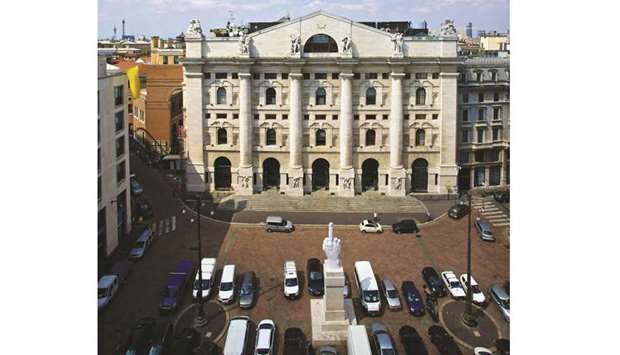Stock markets mostly rose yesterday as investors appeared willing to set aside fears of recession, instead focusing on bargain hunting, analysts said.
They also seemed to largely shrug off political turmoil in Italy.
“Recession nerves look to have settled a little following last week’s panic, which has brought some relief to markets,” said Craig Erlam at OANDA.
Global bond yields stabilised, indicating that markets are becoming less pessimistic about the outlook for the world economy.
Key European equity markets were more than 1% higher by the close.
That included Milan’s FTSE MIB index which rallied as Italian President Sergio Mattarella began talks with key players in a bid to end political limbo in the eurozone’s number three economy.
The index had dived 1.1% on Tuesday after the shock resignation of Prime Minister Giuseppe Conte.
Meanwhile, London’s FTSE 100 closed 1.1% up at 7,203.97 points, Frankfurt’s DAX 30 ended 1.3% higher at 11,802.85 points and
Paris’ CAC 40 finished with a 1.7% gain at 5,435.48 points, while Milan’s FTSE MIB added 1.8% at 20,847.07 points at close.
The EURO STOXX 50 closed 1.2% higher at 3,391.66 points.
“The markets have seemingly taken the latest political upheaval in Italy in their stride and are gaining,” noted XTB analyst David Cheetham.
US stock markets also made a better start, “aided by some stabilisation in global bond yields which had plunged recently to exacerbate market uneasiness and growth concerns”, said Charles Schwab analysts.
The euro flatlined against the dollar as Italy’s crisis offset optimism that Germany’s government could unveil measures to avert a downturn.
Conte resigned this week, hitting out at far-right Interior Minister Matteo Salvini for pursuing his own interests by bringing down the government coalition.
Mattarella must now decide to form a new coalition or call an election, throwing up more uncertainty and another possible budget standoff with the European Union.
“It is not clear whether or not the President will try and put a caretaker government in place at first — though it seems likely that Salvini will be given the reins sooner or later,” Rabobank analyst Jane Foley told AFP.
“The confusion, combined with Salvini’s spending pledges, is potentially a negative factor” for the European single currency, she added.
VTB analyst Neil MacKinnon was more downbeat. “There is an increasing risk of a fresh eurozone debt and banking crisis,” he cautioned.
Investors’ focus was starting to turn to a key speech by Federal Reserve boss Jerome Powell at the end of the week.
Powell’s talk at the central bankers’ gathering in Jackson Hole, Wyoming, is the key event and will be closely pored over for clues about the bank’s plans for next month, with experts unable to agree on whether or not he will announce further cuts.
Rising hopes for China-US trade talks have provided a much-needed lift to markets over the past two days but with few fresh catalysts, dealers are keeping their powder dry ahead of Friday’s address.
The Fed releases minutes of its July meeting later Wednesday which will provide an insight into its deliberations when it cut interest rates for the first time since the financial crisis.
— ‘Crazy’ German bond — In another sign that investors believe in rekindled growth down the road, the German treasury yesterday failed to sell out a 30-year zero-coupon government bond.
The treasury, which had hoped to place two billion euros of debt, in the end found takers for just 824mn.
But those investors that did buy the bond paid over face value, taking the yield to -0.11%, which means that they are paying the German government for the privilege of lending it money for the next three decades.
“It’s crazy,” Eric Vanraes, bond manager at the Eric Sturdza bank, told AFP.

The Borsa Italiana, Italy’s Stock Exchange, in Milan. The FTSE MIB of the bourse added 1.8% at 20,847.07 points at close yesterday.
